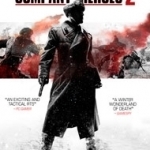
GSVExplorer
Navigation and Travel
App
Search and view Google street view from a visible map region Features - Tap on map view to search...

Tank Battle: East Front 1944
Games and Entertainment
App
Tank Battle: East Front 1944 is the penultimate title in the successful ‘Tank Battle: East...

Babbel – Learn 14 languages
Education and Travel
App
Learn Spanish, French, Italian, German, and many more languages with Babbel, the shortest path to...

Sound Touch
Education and Entertainment
App
OVER 600,000 DOWNLOADS! JOIN THE FUN! YOUR KIDS ARE GOING TO LOVE IT! Trumpets, Harmonicas, Trains,...

BlindSquare
Navigation and Social Networking
App
BlindSquare is pioneering accessible navigation both indoors and outdoors. Know where you are, know...

République
Games and Entertainment
App
In “Episode 5: Terminus," the fifth and final episode of the thrilling République saga, battle...

Dic-Dic. Dictado multilingüe para la práctica de la escritura y de la correspondencia entre sonido y grafía
Education and Games
App
***App featured and recommended by Apple in the App Store Kids section in more than 20 countries*** ...

Adventure Time Game Wizard - Draw Your Own Adventure Time Games
Games and Entertainment
App
"Truly innovative and potentially infinite, Adventure Time Game Wizard is an essential purchase for...

The Refugees...A Story About Change
Book
If there is something i love the most in this life …. I believe it is … socializing with the...
Gareth von Kallenbach (980 KP) rated Company of Heroes 2 in Video Games
Jun 19, 2019
For those that are not familiar with the series, the game task players to take command and construct various military units in an effort to seize key installations and strategic points, destroy enemy troops, and accomplish various strategic tasks. This is easier said than done as the enemy AI is extremely tenacious and adaptable and like battlefield situations, commanders are often forced to improvise and think on the fly one the unexpected happens.
This timeout the game is set in Russia and is told mainly through flashbacks during an interrogation of the disgraced Russian commander. Battles such as Stalingrad and other key elements of operation Barbosa are re-created and the initial battles are focused mainly on slowing the German advance as well as eliminating key resources that might be captured by the enemy.
As the game goes on, the weather becomes an new challenge as the fears Russian winter that proved to be so detrimental to the German forces is an element that must be contended with at all times. Players will not be able to send units on foot to capture very strategic elements or mission objectives without having them freeze to death. The solution to this problem is to have engineering units take a break from constructing buildings in order to create campfires. Players that are left out in the cold too long have a limited amount of time to reach the safety of a campfire or vehicle before they will freeze to death. Needing to ensure that the path to an objective is either stocked with appropriate amounts of fires or save for a vehicle to use is a key element to the strategic points of the game.
Being able to call in airstrikes as well as do more elaborate flanking maneuvers is definitely a high point of the game which adds to the strategy. You want to be very careful about massing your units in one place because to do so would invite an aerial or artillery barrage upon them. As in the previous games, players can take sanctuary in buildings which provides them ample opportunity to snipe at opposing targets. This is not without its limitations though as well-placed assaults including attacks with flamethrowers can soon turn the advantage into a disadvantage as troops may find themselves in a building collapsing around them.
Unlike other games of this type which are heavy on resource gathering to provide necessary funds for additional units, the game towards players points for capturing, holding, and destroying various strategic objectives. The better one does then the more units that will be made available to them. I really enjoy the heavy machine guns, mortar teams, and the cannon fodder conscripts squads, but what really makes the game shine is the ability to call in airstrikes and your armored units. As mentioned earlier about the difficulties in combat in the snow conditions. The game takes weather into account even to the point of providing hit points to the ice. An enemy that is attempting to bring across units supported by armor could be in for real surprise by strategically placed mine or a well-placed shell. Once at the ice becomes weak, then players can use this to their drainage to quickly dispatch units who fall through damage ice with a little bit of urging from their weapons.
Graphically the game shines and I really enjoy being able to use the mouse wheel to zoom into units and get an up close and personal look at them in action. Seeing them diligently go about their tasks be at construction or loading shells into their weaponry is not only beautiful to behold but adds to the sense of immersion. The sites of the game as well as the audio are spot on as key historical elements have obviously been paid attention to in the creation of this game. For example players talk about not seeing sugar in ages or how there are not enough weapons to go around and are instructed to simply head to the enemy and salvage what they can on the battlefield. There is also the element of brutality were troops are told that should you retreat from the enemy you’ll be shot and killed by your own commanders and that objectives must be completed regardless of the cost.
The game offers significant challenge to players of all levels and as such a skill level setting is in place which will allow you to try to find a happy medium for your style of play. There are also ample online opportunities for the game as not only can you play with your friends, you can create custom matches or to randomly assign matches which can pick you and other flesh and blood players up against the computer controlled opponents.
I especially like the ability to directly stream my gameplay to twitch TV as this is an element that we’re definitely looking to take advantage of in the future especially since live streaming is a key element of the upcoming gaming consoles as well .
The path finding in the game is very solid and although there are times when units can become a bit bogged down it is extremely minor especially for games of this type. The success or failure of missions relies solely upon your abilities as a commander. Sure there are times when brute force and overwhelming strength will ensure victory, but resources are at a premium on the Eastern front and players as mentioned earlier, often have to scrounge for resources from fallen soldiers on the battlefield. More than once I thought I was making short work of an enemy with a two-pronged attack only to have an extremely effective counterattack forced me into retreat and regroup mode. I learned during these times that having one unit feint toward an enemy locale wall flanking with two or more other units often worked out well. The enemy would be drawn to the one unit allowing me to get my other units behind them engaging enemy objectives for multiple sides.
This strategy works really well until you come across a machine gun nest and heavy armor which again forces you to improvise on the fly. Mortar and grenade units can do a good job at taking out a machine gun nest it positioned properly but I always found bathing area inflamed to be highly effective.
Regardless of what strategy you employ, Company of Heroes 2 is an extremely impressive and enjoyable game that not only provides plenty of enjoyment and excitement but shows that the series keeps getting better with each new installment.
http://sknr.net/2013/07/29/company-of-heroes-2/
